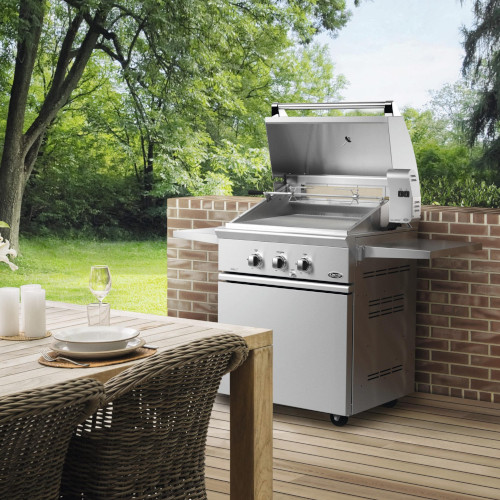Owning a grill can be a great way to enjoy cooking when it begins to warm up outside, but it’s important for you to become familiar with the proper care for gas grills before getting started. Not only will your food taste better when you know how to care for the grill, you can also ensure that it lasts for many summers to come.
Preheat the Grill Before Use
Letting your gas grill heat up fully before using it can significantly extend its lifespan, and here’s why:
1. Efficient Burning of Residue
Over time and after several cooking sessions, remnants of food and grease accumulate on the grates and other parts of the grill. These residues can corrode the metal components, leading to deterioration. When the grill is allowed to heat up entirely, these residues are efficiently burned off. This not only keeps the grill cleaner but also minimizes the chances of corrosive substances sitting on the grates for extended periods.
2. Consistent Heat Distribution
When the grill is adequately preheated, it ensures even heat distribution across the grates. This uniformity in heating is beneficial for the grill’s structural integrity. Uneven heat can cause certain parts of the grill to experience more wear and tear, thereby shortening the equipment’s overall lifespan.
3. Quick Sealing of Juices
When food, especially marinated items, hits a fully heated grill, it cooks faster, sealing in the juices and flavors. This rapid cooking process reduces the amount of time the grill is exposed to dripping marinades and sauces, which can be acidic or sugary. Extended exposure to such substances can speed up the wear and tear of the grates.
4. Reduced Sticking
Foods are less likely to stick to a grill that’s been properly preheated. When food sticks, it often requires more aggressive scraping and cleaning, which can wear down the grates over time. By ensuring the grill is adequately heated before placing your food on it, you’re not only ensuring better-tasting food but also reducing the need for rigorous cleaning.
5. Avoiding Thermal Shock
Constantly subjecting the grill to abrupt temperature changes can lead to thermal shock, which can weaken the metal and cause cracks over time. Preheating ensures a gradual and even temperature increase, which is gentler on the grill’s components.
Immediate Post-Use Cleaning
Maintaining a clean gas grill is pivotal to extending its lifetime and ensuring optimal performance. Here’s a more detailed breakdown of why cleaning your grill is essential and some steps to follow:
Importance of Immediate Cleaning
Once your grilling session is over, bits of food, oil, and marinade are likely to remain on the grates. These residues can become hard to remove if left unattended for too long. Moreover, they can attract pests and mold, potentially damaging the grill.
Quick Brush-off
Use a long-handled grill brush to scrub off any food remnants immediately after every grilling session. This act prevents food particles from hardening on the grates and ensures the next grilling session starts with a clean surface.
Wipe Down
While a full deep clean might not be required after every use, wiping down the exterior of the grill with a damp cloth can prevent grease and grime build-up, which can affect the grill’s appearance over time.
Periodic Deep Cleaning
Grate Cleaning: The grates are directly in contact with the food, so they require special attention. Every few weeks, remove the grates and soak them in a mixture of warm water and dish soap. This will help break down any stubborn residues. Scrub the grates with a wire brush or steel wool, rinse thoroughly, and let them dry completely before replacing them.
Burner Maintenance: Over time, the burner can get clogged with grease and food particles. A clogged burner results in uneven heat distribution, impacting the cooking process and potentially shortening the grill’s lifespan. Remove the burner covers and brush the burners with a soft brush. Ensure all the ports are open and free from debris.
Interior Cleaning: Even though the main focus is on the grates and burners, the grill’s interior can accumulate grease and food particles. Remove any large particles and then wipe down the walls and the underside of the grill lid with a solution of water and dish soap. This step prevents potential flare-ups caused by grease build-up.
Drip Pan Maintenance: The drip pan catches most of the excess grease and juices. Empty and clean the pan regularly to prevent it from overflowing or causing unwanted flare-ups. A clean drip pan also minimizes the risk of unwanted pests.
Inspection After Cleaning: Once you’ve cleaned the essential parts, take a moment to inspect hoses, connections, and other parts for any signs of wear, damage, or clogging. While this is not directly related to cleaning, it ensures the grill is in optimal condition after a deep clean.

